Dealer may refer to:
Dealer may refer to:
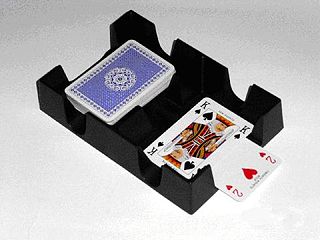
In card games, to cut the cards is to split the deck into two packets by lifting one packet from the top and placing it face down next to the remaining cards beneath it. The lower packet is then placed on top of it. This is typically done after the cards have already been shuffled, and the procedure is used just prior to the cards being dealt to the players. The aim of this is to reduce the possibility of cheating, for example, by knowing the top or bottom card. Cutting the cards is also a common way of determining the seating order at a card table, the partnerships or the first dealer.
A killer is someone or something that kills, such as a murderer or a serial killer.

Texas hold 'em is one of the most popular variants of the card game of poker. Two cards, known as hole cards, are dealt face down to each player, and then five community cards are dealt face up in three stages. The stages consist of a series of three cards, later an additional single card, and a final card. Each player seeks the best five-card poker hand from any combination of the seven cards: the five community cards and their two hole cards. Players have betting options to check, call, raise, or fold. Rounds of betting take place before the flop is dealt and after each subsequent deal. The player who has the best hand and has not folded by the end of all betting rounds wins all of the money bet for the hand, known as the pot. In certain situations, a "split pot" or "tie" can occur when two players have hands of equivalent value. This is also called "chop the pot". Texas hold 'em is also the H game featured in HORSE and HOSE.
Proxy may refer to:
Card players are those participating in a card game. Various names are given to card players based on their role or position.
Contra may refer to:

Bourré is a trick-taking gambling card game primarily played in the Acadiana region of Louisiana in the United States of America. It is also played in the Greek island of Psara, with the name Boureki. The game's closest relatives are probably Spades and Euchre; like many regional games, Bourré sports many variant rules for both play and betting considerations.

In poker, the buck or dealer button is a marker used to indicate the player who is dealing or, in casino games with a house dealer, the player who acts last on that deal. The term button is also used for a variety of plastic discs, or lammers, used by casinos to mark the status of players.

Monopoly: The Card Game is loosely based on the board game Monopoly. The idea is to draw, trade and organize cards into "color-groups" along with bonus cards. Players take turns drawing and discarding cards until one completes a hand. The value of each player's hand is then counted and they receive the amount of Monopoly money they have earned. The first person to collect $10,000 wins.
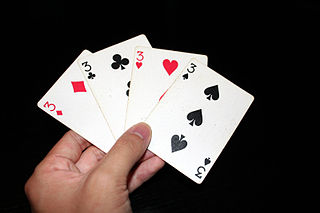
Liverpool rummy is a multi-player, multi-round card game similar to other variants of rummy that adds features like buying and going out. It is played the same as Contract rummy, except that if a player manages to cut the exact number of cards required to deal the hand and leave a face-up card, then the cutting player's score is reduced by 50 points.
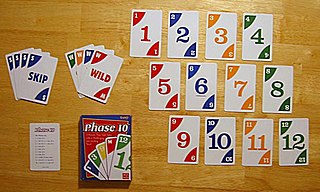
Phase 10 is a card game created in 1982 by Kenneth Johnson and sold by Mattel, which purchased the rights from Fundex Games in 2010. Phase 10 is based on a variant of rummy known as contract rummy. It consists of a special deck equivalent to two regular decks of cards, and can be played by two to six people. The game is named after the ten phases that a player must advance through in order to win. Many people shorten the game by aligning it to baseball rules and consider 5.5 phases to be a complete game when running out of time to complete the full ten phases. Whoever is in the lead when play stops if someone has completed 5.5 phases or more is the winner.
3-5-8, also known as sergeant major for its popularity among members of the Royal Air Force, is a trick-taking card game for 3 players, based on whist, using a standard 52 card deck. 3-5-8 may be played as a gambling game, and there are many variations with names like "8-5-3" and "9-5-2" played throughout the world.
Psycho may refer to:
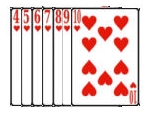
Rumino is a knock rummy card game of Italian origin for up to six people, in which players try to form sets or sequences of cards. It may possibly have been devised in America during the 1940s by Italian immigrants by adapting the game Scala Quaranta to Gin rummy. It is usually played for small stakes Two 52-card decks are used plus four Jokers comprising 108 cards.
304, pronounced three-nought-four, is a trick-taking card game popular in Sri Lanka, coastal Karnataka, Tamil Nadu and Maharashtra, in the Indian subcontinent. The game is played by two teams of two using a subset of the 52 standard playing cards so that there are 32 cards in play.
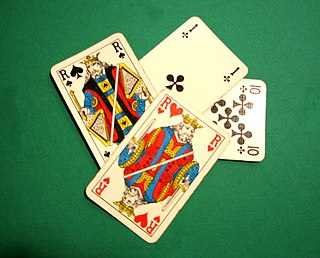
Baloot, is a popular trick card game played in the Arabian Peninsula, which is similar to the French game Belote.
99 may refer to:
The following is a glossary of poker terms used in the card game of poker. It supplements the glossary of card game terms. Besides the terms listed here, there are thousands of common and uncommon poker slang terms. This is not intended to be a formal dictionary; precise usage details and multiple closely related senses are omitted here in favor of concise treatment of the basics.
Draw poker is any poker variant in which each player is dealt a complete hand before the first betting round, and then develops the hand for later rounds by replacing, or "drawing", cards.
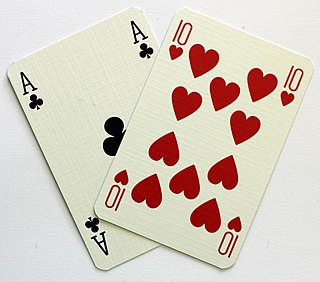
Pontoon, formerly called Vingt-Un, is a card game of the banking family for three to ten players and the "British domestic version of Twenty-One," a game first recorded in 17th-century Spain, but which spread to France, Germany and Britain in the late 18th century, and America during the early 19th century. It is neither a variant of nor derived from Blackjack. Both are descended from the early British version of Vingt-Un. In Britain, it first became known as Pontoon during the First World War, the name apparently being a soldier's corruption of its former French name. The game has no official rules and varies widely from place to place. It is a popular family game, but also widely played by children, students, and members of the armed forces. In 1981, Pontoon was the third most popular card game in Britain after Rummy and Whist. It has been described as "an amusing round game and one which anyone can learn in a few minutes."